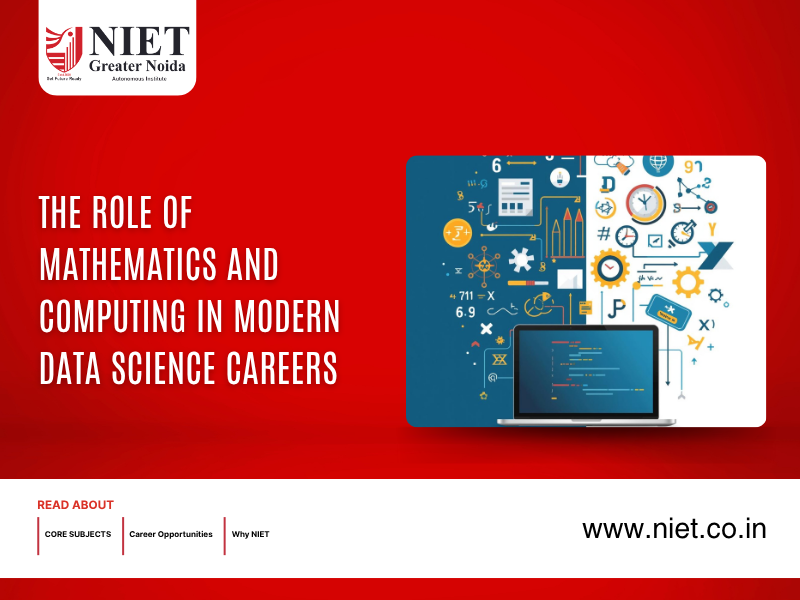In today’s digital-first world, data has become the new currency. From predicting consumer behavior to optimizing business operations, data drives almost every decision. Behind this data revolution lies the powerful synergy of Mathematics and Computing, two disciplines that form the backbone of Data Science. For every aspiring college student looking to build a career in analytics, machine learning, or artificial intelligence, a strong foundation in Mathematics and Computing is indispensable.
Understanding the Importance of Mathematics and Computing
At the core of Data Science lies the ability to understand patterns, relationships, and trends hidden within massive datasets. Mathematics and Computing play a vital role in this process by providing the tools and techniques necessary for data analysis, algorithm design, and predictive modeling.
- Mathematics: Builds analytical thinking and provides the theoretical framework behind statistics, probability, and linear algebra — key components in machine learning and AI.
- Computing: Offers the technological foundation through programming, databases, and computational tools that make it possible to process and visualize large-scale data.
How Mathematics Powers Data Science
Every data-driven solution begins with a mathematical concept. Whether it’s calculating probabilities, identifying correlations, or building predictive models, mathematical principles guide every step of the process.
- Statistics and Probability: Essential for hypothesis testing, decision-making, and uncertainty analysis.
- Linear Algebra: Powers algorithms in deep learning and computer vision.
- Calculus: Used in optimization functions that train AI and machine learning models.
- Discrete Mathematics: Fundamental for algorithm design and data structures.
How Computing Brings Data Science to Life
While mathematics provides the theory, computing makes it actionable. Data scientists rely on computing skills to collect, process, and interpret vast datasets using advanced algorithms and programming languages.
- Programming Languages: Python, R, and SQL for data manipulation and analysis.
- Data Visualization Tools: Power BI, Tableau, and Matplotlib to represent insights clearly.
- Machine Learning Algorithms: Developed using computing principles for automation and intelligence.
- Cloud and Big Data Technologies: Enable scalable data storage and processing.
Career Opportunities in Mathematics and Computing
The combination of Mathematics and Computing opens doors to some of the most sought-after careers in the global market, allowing graduates to work across industries like technology, finance, healthcare, research, and manufacturing.
- Data Scientist / Data Analyst
- Machine Learning Engineer
- AI Researcher
- Software Developer
- Business Intelligence Analyst
- Quantitative Analyst (FinTech)
- Computational Scientist
How Engineering Colleges Are Integrating Mathematics and Computing
Modern engineering colleges are updating their curriculum to meet the growing demand for data-centric learning, blending theoretical knowledge with real-world computational skills.
- Offering Mathematics and Computing programs with interdisciplinary learning modules.
- Incorporating AI, Machine Learning, and Data Analytics into core subjects.
- Setting up research labs and innovation centers for practical exposure.
- Collaborating with industries for internships and live projects.
Why NIET Is the Ideal Destination for Mathematics and Computing
Among top engineering colleges, NIET stands out as a pioneer in preparing students for data-driven careers. Its autonomous curriculum in Mathematics and Computing equips students with technical expertise, problem-solving abilities, and analytical insight.
- Comprehensive Curriculum: Integrates core mathematical theories with modern computational techniques.
- State-of-the-Art Labs: Equipped with high-performance computing systems and AI tools.
- Experienced Faculty: Combines academic excellence with industry experience.
- Industry Collaborations: Partnerships with leading organizations for internships, workshops, and placements.
- Skill Enhancement Programs: Focused on coding, data analytics, and machine learning.
The Future of Mathematics and Computing in Data Science
As AI, automation, and digital systems evolve, the relevance of Mathematics and Computing will only grow. Future data scientists and engineers will need these skills to design intelligent systems that learn and adapt autonomously.
- AI-driven automation in analytics and forecasting.
- Quantum computing for advanced problem-solving.
- Predictive modeling for business intelligence.
- Cross-disciplinary applications in biotechnology, healthcare, and finance.
Conclusion
The combination of Mathematics and Computing lies at the heart of the modern data revolution. It empowers students to transform complex data into actionable insights and design intelligent algorithms that solve real-world problems. For aspiring data scientists and engineers, choosing an engineering college that prioritizes these disciplines — like NIET — ensures the perfect blend of theory, practice, and industry exposure.


















